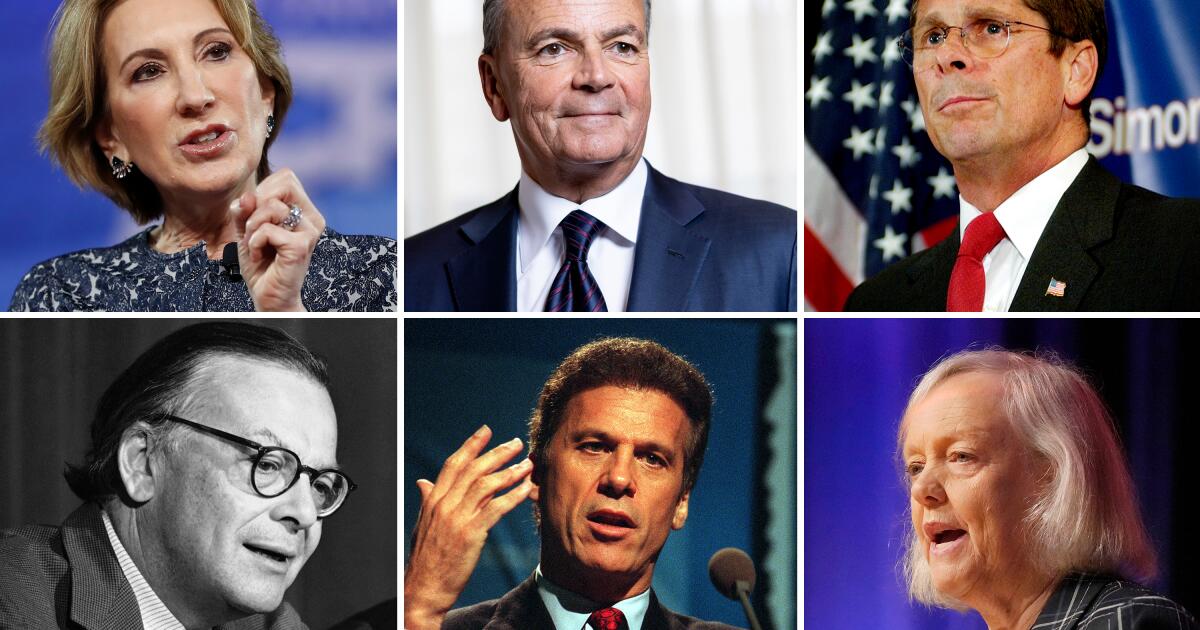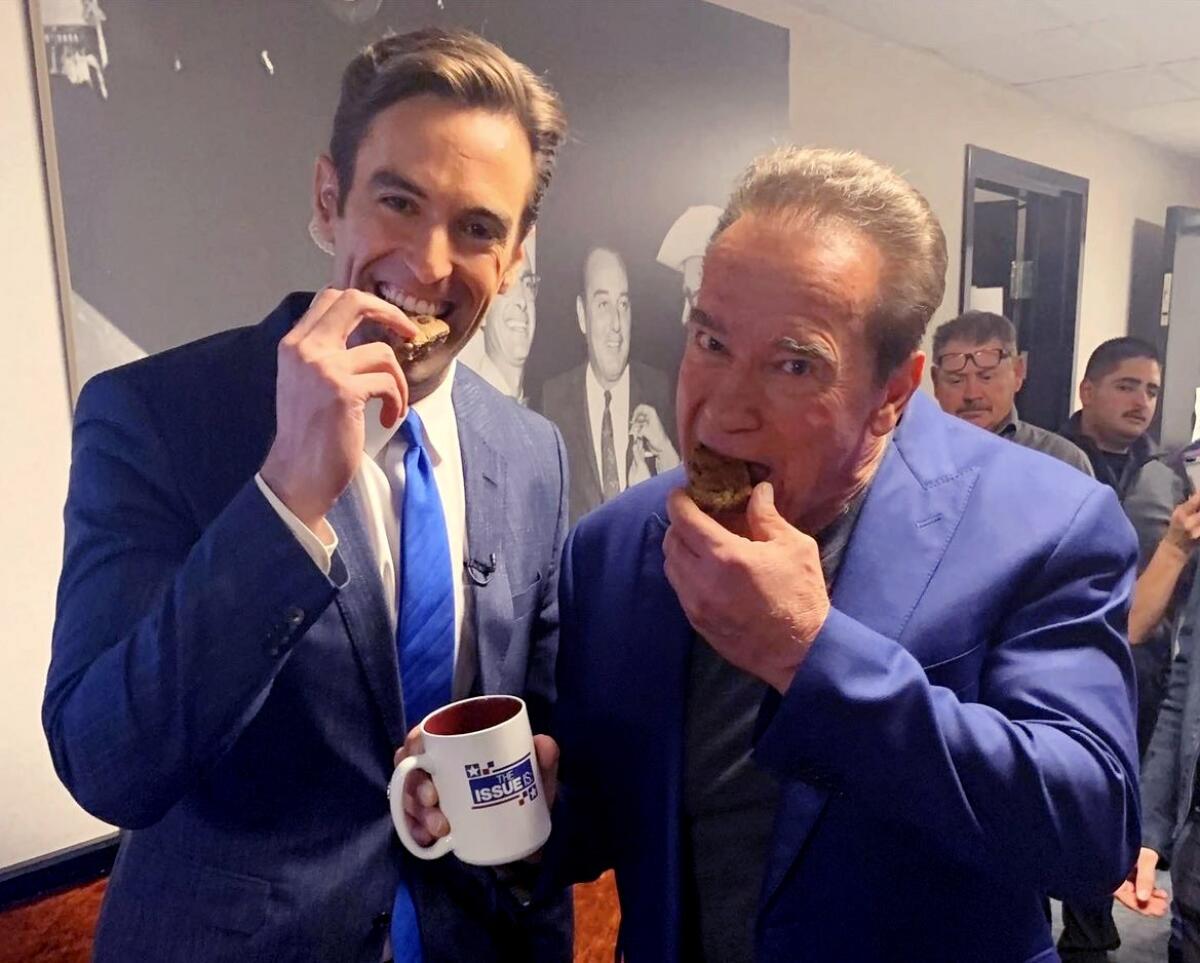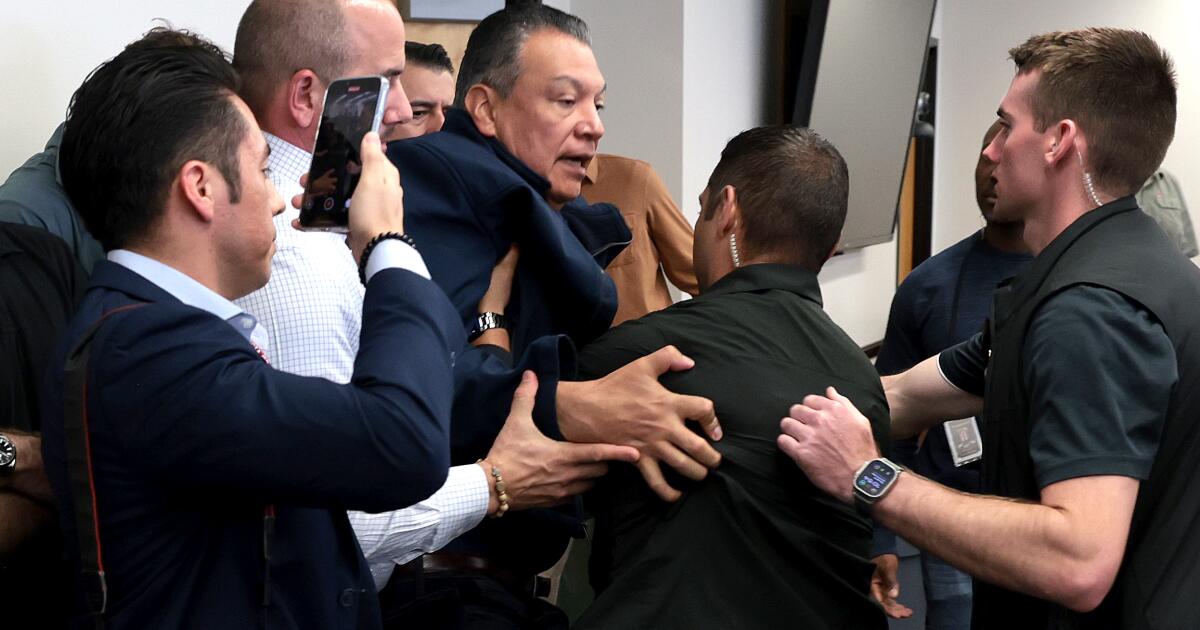Voters have spurned rich candidates for California governor, U.S. Senate
The rich, to paraphrase F. Scott Fitzgerald, are different. In California, they lose a lot of very expensive, very high-profile political races.
Over the past 50-plus years, a half-dozen fabulously wealthy men and women — William Matson Roth, Meg Whitman, Carly Fiorina among them — have clambered atop their hefty cash piles and, despite any significant political experience, tried to launch themselves into the office of governor or U.S. senator.
Every last one of them failed.
Others with at least some background in elected office — Michael Huffington, Jane Harman, Richard Riordan to name a few — sunk a goodly chunk of their fortunes and came up similarly short in their efforts to win one of California’s top two political posts.
That history is worth noting as the very-well-to-do Rick Caruso eyes a possible entry into the wide-open race to succeed Gavin Newsom. Caruso recently told my colleague Julia Wick he was “very seriously considering” both a gubernatorial run and a second try for Los Angeles mayor.
“I’m running down two parallel paths,” the billionaire developer said. “As we speak, there are teams very busy working on both of those paths.”
(Wealthy businessman Stephen J. Cloobeck, another political first-timer, has been campaigning for governor for months, spending liberally to little avail.)
There’s a common disclaimer in the field of investment — “past performance is no guarantee of future returns” — which certainly applies here.
Still, as waiting-for-Caruso replaces waiting-for-Kamala among political gossips, it’s worth asking whether there’s something — floating in the air, mixed in the water or soil — that has made California such an inhospitable place for so many lavishly monied candidates. Unlike, say, Illinois or New Jersey, which elected billionaire neophyte JB Pritzker and multimillionaire Frank Lautenberg, as, respectively, governor and U.S. senator.
Part of the reason could be the particular political climate.
“If you’re the rich outsider, you have to show up in an election cycle where people want the outsider,” said Rob Stutzman, a Republican strategist who worked for Meg Whitman’s failed 2010 gubernatorial campaign, which cost a cool $180 million.
(Yes, $180 million. The former tech CEO coughed up most of that sum at a time California’s median household income was about $61,000.)
All that lucre couldn’t override the prevailing sentiment among discontented voters who were ready, after nearly eight years of the uber-outsider Arnold Schwarzenegger, to embrace the tried-and-true experience of the reemergent Jerry Brown.
That said, there’s a lengthy enough record of futility to suggest more is at work than the changeable mood of a fickle electorate.
Garry South believes California voters are of two minds when it comes to super-rich candidates. In 1998, the Democratic strategist helped Lt. Gov. Gray Davis maneuver past two moneybags, billionaire former airline executive Al Checchi and Rep. Harman, to win the governor’s race. Four years later, South led Davis’ successful reelection campaign against another multimillionaire newcomer, William Simon Jr.
“Part of them kind of admires someone who went out and made a killing in our capitalistic society … and walked away filthy rich,” South said of voters’ dueling impulses. “But they also have a suspicion that, because of their wealth and because of the benefits that it confers on that person, they don’t really know how the average person lives.”
Call it an empathy gap.
Or, perhaps more aptly, an empathy canyon.
“If somebody has $150 million sitting around they can dump into a campaign for public office,” South said, channeling the skeptical sentiment, “what understanding do they have of my day-to-day life?”
Bill Carrick, a consultant for Harman’s 1998 campaign, agreed it’s incumbent on a rich candidate to “have something substantive to say and be able to articulate why you’re going to make people’s lives better.”
That’s no different than any other office-seeker. But unlike less affluent, more relatable candidates, a billionaire or multimillionaire has a much heavier burden convincing voters they know what they’re talking about and genuinely mean it.
Don Sipple, who helped elect Schwarzenegger governor in California’s 2003 recall election, said wealth often comes with a whiff of privilege and, even more off-putting, an air of entitlement. (To be clear, Schwarzenegger won and replaced Davis because he was Arnold Schwarzenegger, not because of his personal fortune.)
A lot of California’s failed rich candidates, Sipple said, appeared viable — especially to political insiders — “because of their money. And they really didn’t have anything to offer beyond that.”
“It’s the same as somebody who goes out and tries to earn a job,” he went on. “You never deserve it. You’ve got to out and work for it. And I think voters make the distinction.”
Of course, wealth confers certain advantages. Not least is easy access to the extraordinary sum it takes to become well-known in a place with more eligible voters — nearly 27 million, at last count — than the population of all but a handful of states.
California is physically immense, too, stretching approximately 800 miles from north to south, which makes costly advertising the only realistic way to communicate in a statewide top-of-the-ticket contest.
There’s another old aphorism about wealth, credited to the burlesque star and actress, Sophie Tucker. “I’ve been rich,” she famously said, “and I’ve been poor. Rich is better.”
That’s undeniably true, so far as it goes.
The singer and comedian never tried to be governor or a U.S. senator from California.


